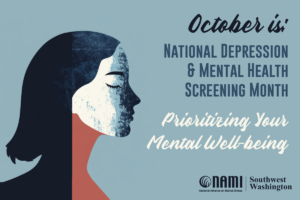By Jason Reid
“How are you feeling?”
Think about the last time you asked your teen that question. Most likely, what you were really asking was, “Are you physically sick?” And, if you’re anything like me, you immediately entered “fix it mode” if your kid expressed even the slightest physical issue. Doctor’s appointments. Medication. Nourishing meals. As parents, we prioritize our kids’ physical health almost instinctively. But what about their mental health?
For as long as I can remember, “How are you feeling?” was a question I asked only if my children were home sick from school. My perspective on those four words changed forever in March 2018. While my wife and I were away in Mexico celebrating her birthday, we got a text message from our son, Ryan. He told us he loved us and said goodbye. Then, he took his own life — our talkative class clown and gifted storyteller was gone at 14 years old.
As I write this, youth suicide is affecting families across the nation. Since 2007, the suicide rate among American youth ages 10 to 24 has increased by almost 60%. In September 2020, during the COVID-19 pandemic, kids ages 11 to 17 reported the highest rates of suicidal ideation compared to any other age group.
In the months following Ryan’s death, I absorbed the disheartening statistics. Then, I spoke with countless doctors, community leaders, experts and parents about youth mental health. Through those conversations, I came to believe that parents should start getting more involved with their kids’ mental health.
I’m not a psychologist or a mental health expert. I’m a guy who lost his son and spent the last year and a half trying to figure out why. But I do know this: If we foster emotional connections with our children, tell our stories and acknowledge our kids’ mental health, we can make critical changes.
I believe these changes can start with rethinking those four simple words: “How are you feeling?”
Get Your Kid Talking
Plenty of parents have all barged into their teens’ rooms and told them, “We need to talk.” This, I believe, isn’t the recipe for meaningful conversations. That room is their sanctuary — their safe place. Your child isn’t likely to talk with you in this situation, let alone open up about their mental health.
Instead, find the place and time when your child wants to talk. Maybe that will be when you’re driving to school or, if you’re like my older son and me, during a round of golf. My conversations with Ryan would usually come after watching a movie together. Looking back, this was a missed opportunity for a deeper connection. At the time, I didn’t know how to ask the right questions.
When you’ve identified the right time and place, ask your child, “How are you feeling?” Then, listen and go deeper. If they say they had a rough day with friends, don’t shrug it off. Ask how that event made them feel and acknowledge what they share.
Stop Fixing (And Start Getting Vulnerable)
These early conversations will help your teen get comfortable sharing how they feel and why. But they’ll also help you get comfortable with reality: You can’t necessarily fix every emotional challenge your child has, no matter how hard you try. The sooner you leave behind the urge to “fix it,” the sooner you can forge a meaningful emotional connection.
I often describe the dynamic like this: If Ryan and I are outside on a sunny day, I can say, “What a beautiful day.” But he’ll still think it’s a cloudy day. Parents have to let their kids experience cloudy days; otherwise, they’ll stop sharing as soon as things get tough. A big part of that process is letting go of the “I can fix it” mentality. But it’s equally important to show your kids that you have cloudy days, too.
One of the biggest mistakes I made with Ryan was making him feel as though everything in my life was perfect. When everything in his life wasn’t perfect, he hid it. By sharing our own experiences, we can help our teens put their feelings into context — when things are going well and when they’re not.
Approach The Topic Of Suicide
Once your teen is talking openly about their emotions, keep listening and asking questions. If what they tell you sounds serious or raises any self-harm warning signs, it’s time to broach the subject of suicidal thoughts.
Approach the topic by asking your teen a question such as, “Have you ever felt bad enough that you’ve thought of hurting yourself?” Many parents feel uncomfortable with this question. The ones I’ve spoken to often worry that the mere mention of suicidal thoughts could put the idea into their child’s head. However, we’re living in a world with endless content — both helpful and harmful — at our children’s fingertips. Your teen has heard about suicide before. And studies show that talking about suicide does not increase its prevalence.
If your child has considered self-harm, explore the “when” and “how.” Are they currently thinking about self-harm? Do they have a plan to act on these thoughts? If the answer to either of those questions is “yes,” it is time to seek professional help. If your child doesn’t have a plan, keep talking. Make sure they understand that thoughts alone don’t make someone suicidal. Then, you can share your own experiences with mental health to help them understand their feelings.
Ultimately, when our children are unwell, we make sure they get the help they need. To prevent teen suicide, we need to approach our children’s mental health with the same sense of compassion, care and ownership as we do their physical well-being. Talking about suicide isn’t necessary for every child and every situation but asking “how do you feel?” always is.
If you or someone you love is having thoughts of suicide, please call the National Suicide Prevention Lifeline at 800-273-TALK. The hotline’s professionals are available to you 24/7/365.
Jason Reid is an entrepreneur, filmmaker and youth mental health advocate. His documentary, Tell My Story, chronicles his search for answers in the months following his teenage son’s suicide.
Source: https://nami.org/Blogs/NAMI-Blog/November-2021/How-to-Talk-to-Your-Teen-About-Suicide




